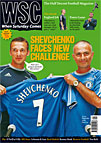 Damien Blake looks back on the last season when a win meant two points and the FA Cup holders played outside the top flight
Damien Blake looks back on the last season when a win meant two points and the FA Cup holders played outside the top flight
The long-term significance
This was the final season played under two points for a win. The addition of an extra point was one of the recommendations made in a document called Soccer – The Fight For Survival. Put together by a group of club officials and managers, including Terry Venables and Graham Taylor, the report had been triggered by concern over a variety of issues, notably falling attendances. This was also the last time to date that the FA Cup holders played outside the top flight. West Ham had won the trophy in May 1980, beating Arsenal 1-0 (with a rare Trevor Brooking header that was still a source of mirth to his Match of the Day colleagues 20 years later) but they had only finished seventh in Division Two, six points off a promotion place.
Story of the season
Unbeaten Blackburn topped the table until early October then slumped, with six defeats in nine games. After rallying in the New Year, they lost a decisive match, 2-0 at Swansea in April. John Toshack’s Swans, finishing in their highest League position to date, completed their rise from Fourth Division to First in four seasons with a 3-1 win at Preston on the final day. Notts County, guided by veteran Scottish midfielders Eddie Kelly and Don Masson, returned to the top division after a 55-year absence. Having recovered from a dismal winter run of 12 matches without a win, County clinched promotion with a 2-0 victory at Chelsea in the penultimate round. With strikers David Cross and Paul Goddard scoring consistently, West Ham had the title wrapped up in early April. The Hammers also returned to Wembley, drawing the League Cup final with Liverpool, but losing the replay at Villa Park. They lost a Cup-Winners Cup quarter-final to Dynamo Tbilisi. The two Bristol clubs seemed hellbent on relegation from the off – Rovers took 15 matches to register a victory while City, saddled with players’ contracts they couldn’t afford to pay, were winless in their first nine. Bobby Houghton, who had taken Malmo to a European Cup final two years previously, was in charge of City when they went down, but left before their record-breaking third successive relegation in 1981-82.
For the record books
Newcastle endured their worst ever season for goals. They scored a minuscule eight away, three coming in one match at Preston, and were involved in 11 scoreless draws. Still, things were about to look up – 19‑year‑old winger Chris Waddle made his League debut in December. Chelsea, managed by Geoff Hurst, had a bizarre second half of the season, scoring in just three of their last 21 games – two of those being consecutive 3-0 wins. Hurst, who had been voted manager of the month twice earlier in the season, left in April and never took another job in management.
Same place today
Only six of these clubs are playing in the Championship this season. Luton, Derby, Sheffield Wednesday and QPR all moved up to Division One subsequently, before falling further down. Preston didn’t return to this division until promoted under David Moyes in 2000. Cardiff went down the following year, came back for two seasons from 1983, then stayed in the lower divisions until three years ago.
Moved furthest away
Cambridge Utd are now in the Conference; Shrewsbury also spent two seasons there before coming back in 2004-05. A further 11 clubs dropped down to Division Four, including two of the promoted sides, Notts County and Swansea.
Went on to greater things
Howard Kendall ~ Blackburn’s player-manager earned a move to Everton, where he was to win two League titles in the first of his three spells in charge, as well as an FA Cup and a Cup-Winners Cup.
Brian Kilcline ~ Fearsome centre-half, promoted in his second season with Notts County. Went on to win the FA Cup with Coventry in 1987.
Gary Mabbutt ~ Bristol Rovers’ joint top scorer, with five goals, joined Tottenham in 1982. Like Brian Kilcline, the famous diabetic was to score an own goal in the 1987 FA Cup final, in his case the decisive one in Spurs’ 3-2 defeat.
Disappearing from view
Duncan McKenzie ~ The erratically brilliant striker, a fan favourite at all his many clubs, retired after his second season with Blackburn. Now a radio presenter.
Crowds ~ Gates were 11 per cent down on the previous season, with half the 22 clubs in Division Two averaging fewer than 10,000 per match.
Brian Kidd ~ A Manchester United scorer in the 1968 European Cup final aged 18, retired after his one season with Bolton, his only spell outside the top flight.
Red and yellow cards ~ Dropped in mid-season, having been used by referees in England since 1975-76. Brought back in 1987.
From WSC 235 September 2006. What was happening this month